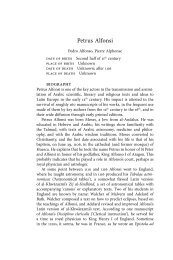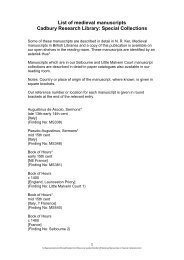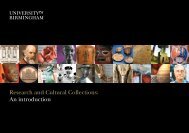reimagining-abstracts - University of Birmingham
reimagining-abstracts - University of Birmingham
reimagining-abstracts - University of Birmingham
You also want an ePaper? Increase the reach of your titles
YUMPU automatically turns print PDFs into web optimized ePapers that Google loves.
The dangers <strong>of</strong> an unquestioning reverence towards the past are highlighted in<br />
Ritsos’ poetry. Surviving is not enough: one must put down the burden <strong>of</strong> the past in<br />
order to be free to look forward to the future. Ritsos, however, also demonstrates how<br />
difficult that is because <strong>of</strong> the hold that the past has on the present. He demonstrates<br />
this both in terms <strong>of</strong> the classical source texts and contemporary events. Ritsos’<br />
Electra personas are survivors <strong>of</strong> the wars that plagued Greece throughout its long<br />
history. They are surrounded by death, loss and the ghosts <strong>of</strong> the past. Only by their<br />
death can they serve the future. Ritsos never <strong>of</strong>fers his readers any solutions for the<br />
future, however, just questions. He thus reprises one <strong>of</strong> the main functions <strong>of</strong> ancient<br />
drama as a platform for the exploration <strong>of</strong> a variety <strong>of</strong> dilemmas.<br />
Rosemary E. Bancr<strong>of</strong>t-Marcus<br />
fbmrem@base.be<br />
Classical themes and allusions in Veneto-Cretan literature: the role<br />
<strong>of</strong> the local Neoplatonic Academies<br />
Many <strong>of</strong> the Veneto-Cretan Renaissance literary works <strong>of</strong> c. 1560-1669 are based on<br />
classical themes or imbued with classical allusion, sometimes filtered through<br />
vernacular versions. Treatment <strong>of</strong> this material ranges from satire to exploitation for<br />
spectacle to serious exploration <strong>of</strong> themes <strong>of</strong> particular interest or relevance to Cretan<br />
society. Thus, we have dramatic interludes based on the Iliad and the Metamorphoses;<br />
a pastoral tragicomedy set in ancient Arcadia; a tragedy set in Memphis, capital <strong>of</strong><br />
Egypt; a romance <strong>of</strong> chivalry set in pre-Christian Athens; and comedies enlivened by<br />
ludicrous misunderstandings <strong>of</strong> the Pedant’s would-be learned allusions (the last<br />
suggesting an audience <strong>of</strong> considerable educational sophistication). This should not<br />
come as a surprise. Three Neoplatonic Academies are attested as having existed in<br />
Crete under Venetian rule: the Vivi <strong>of</strong> Rethymno (1560s); the Stravaganti <strong>of</strong> Iraklio<br />
(1590s), who sponsored some local theatrical performances; and the Sterili <strong>of</strong> Chania<br />
(1630s).<br />
The Sterili may have had an earlier precursor. A group <strong>of</strong> Cretan youths<br />
studying in Italy were fortunate enough to have witnessed the inaugural performance<br />
<strong>of</strong> Oedipus Rex (in Italian translation) at the new Teatro Olimpico in Vicenza; on<br />
their return to Crete in the mid-1580s, they badgered their elders to set up an <strong>of</strong>fshoot<br />
<strong>of</strong> the Accademia Olimpica in their home town <strong>of</strong> Chania. At just this time, Georgios<br />
Chortatsis was composing his plays Panoria and Erophile, which he dedicated to two<br />
wealthy notables <strong>of</strong> Chania. Thus, the same educated elite who founded the<br />
Academies, and who enjoyed discussing philosophy, studying classical and Byzantine<br />
texts, producing critical editions and parallel translations, composing verses in Tuscan<br />
Italian, Latin and Pindaric Greek, and delivering orations replete with beautiful<br />
imagery, may also have been instrumental in encouraging literary and dramatic<br />
composition in the Cretan dialect, spoken and understood by all longterm residents <strong>of</strong><br />
Crete.<br />
Erato Basea<br />
“I am (not) the Acropolis”:<br />
Filmmaking, national culture and the anxiety <strong>of</strong> heritage<br />
The paper draws on recent scholarship on the Acropolis as the quintessential<br />
'symbolic capital' <strong>of</strong> Greece and moves on to discuss three recent films where the<br />
ancient monument takes centre stage: Akropolis (dir. Eva Stefani), Parthenon (dir.<br />
Costa Gavras), and My Life in Ruins (dir. Donald Petries). What links these casestudies<br />
together is that Acropolis becomes in them a topos <strong>of</strong> surveillance and<br />
2







![Benyamin Asadipour-Farsani [EngD Conference abstract]](https://img.yumpu.com/51622940/1/184x260/benyamin-asadipour-farsani-engd-conference-abstract.jpg?quality=85)









